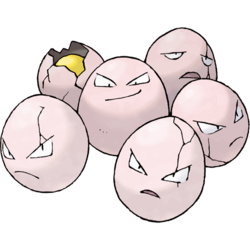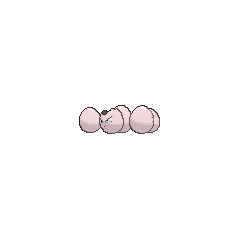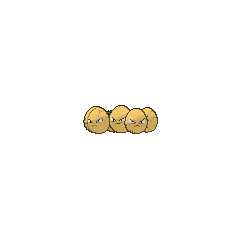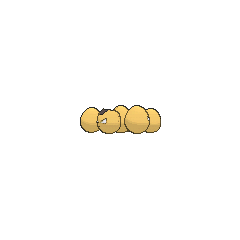From Bulbapedia, the community-driven Pokémon encyclopedia.
Exeggcute (Japanese: タマタマ Tamatama) is a dual-type Grass/Psychic Pokémon.
It evolves into Exeggutor when exposed to a Leaf Stone.
Biology
Exeggcute is a Pokémon resembling six light pink eggs, usually seen arranged with five heads huddled around a sixth. Each "head" has a slightly different facial expression, but each face has triangular eyes with tiny black pupils and a small mouth. Each shell has some cracks, and one member of the bundle usually has its yolk or brain exposed. Despite looking like eggs, Exeggcute is actually more closely related to plant seeds. Exeggcute inhabit jungles and forests.
Exeggcute gathers in swarms of six. The heads communicate with each other by using a form of telepathy that only they can understand. Should the number of Exeggcute be reduced to less than six, the remaining Exeggcute will attempt to replace it with a similarly sized Pokémon as seen in the anime. Exeggcute and its evolved form, Exeggutor, are the only known Pokémon that can learn Barrage.
In the anime
Major appearances
Exeggcute's first major role was in The March of the Exeggutor Squad. The Egg Pokémon was owned by an incompetent magician named Melvin. Exeggcute managed to hypnotize Ash and Melvin forced Ash to capture a bunch of Exeggutor. Melvin's Exeggcute managed to evolve, but without using a Leaf Stone.
Exeggcute also appeared in Pikachu's Rescue Adventure. Pikachu and company, plus an Elekid, found Misty's Togepi hanging around an Exeggcute that was missing a member of its batch. It evolved when all the eggs were back together, standing on a Leaf Stone.
Minor appearances
Exeggcute first appeared in Pokémon Scent-sation!.
An Exeggcute was seen on a photo in The Breeding Center Secret.
An Exeggcute under the ownership of Stella appeared in It's Mr. Mime Time.
Multiple Exeggcute were among the Pokémon seen at Professor Oak's Laboratory in Showdown at the Po-ké Corral.
An Exeggcute was one of the Pokémon living in Len Town in The Psychic Sidekicks!.
Multiple Exeggcute appeared in An EGG-sighting Adventure! in their nests.
An Exeggcute appeared in The Green Guardian and One Team, Two Team, Red Team, Blue Team!.
Pokédex entries
| Episode
|
Pokémon
|
Source
|
Entry
|
| EP043
|
Exeggcute
|
Ash's Pokédex
|
Exeggcute, an Egg Pokémon. Although it resembles an egg, it is known to be more closely related to the seed of a plant.
|
|
In the manga
In the Pokémon Adventures manga
Exeggcute debuts in Long Live the Nidoking! where it is scene as one of the Pokémon at Fuschia City's Safari Zone and in the next round A Hollow Victreebel where multiple Exeggcute were captured by red off-screen.
Bill is seen with an Exeggcute in Pokémon Adventures. In Slugging It Out With Slugma it appeared again with its trainer when he was talking to Professor Oak, however it kept being a nuisance during the conversation along with Bill's Vulpix. Prior to the events of Volume 23, it has since evolved into Exeggutor.
In Murkrow Row an Exeggcute is one of the many pokémon Gold owns at his house, it is noticeable that there are only five "heads" instead of six and none of them have any cracks.
In The Last Battle XIII an Exeggcute was one of the Pokémon sent to help the fight in Ilex Forest.
In the Pokémon Pocket Monsters manga
Red received an Exeggcute from Professor Oak in Fierce Competition at the Pokémon Baseball Tournament!. He was shown to have another one in PM042.
In the TCG
- Main article: Exeggcute (TCG)
Game data
Pokédex entries
| Generation I
|
|
| Red(ENG)
|
Often mistaken for eggs. When disturbed, they quickly gather and attack in swarms.
|
| Blue
|
| Yellow
|
The heads attract each other and spin around. There must be 6 heads for it to maintain balance.
|
| Stadium
|
A Pokémon that is like the seeds of a plant. If you find one and chase it, others will join it without you noticing.
|
|
|
| Generation II
|
|
| Gold
|
The shell is very durable. Even if it cracks, it can survive without spilling the contents.
|
| Silver
|
Using telepathy only they can receive, they always form a cluster of six Exeggcute.
|
| Crystal
|
If even one is separated from the group, the energy bond between the six will make them rejoin instantly.
|
| Stadium 2
|
The shell is very durable. Even if it cracks, it can survive without spilling the contents.
|
|
|
| Generation III
|
|
| Ruby
|
This Pokémon consists of six eggs that form a closely knit cluster. The six eggs attract each other and spin around. When cracks increasingly appear on the eggs, Exeggcute is close to evolution.
|
| Sapphire
|
| Emerald
|
It consists of six eggs that care for each other. The eggs attract each other and spin around. When cracks increasingly appear, it is close to evolution.
|
| FireRed
|
Even though it appears to be eggs of some sort, it was discovered to be a life-form more like plant seeds.
|
| LeafGreen
|
It is often mistaken for eggs. When disturbed, they gather quickly and attack in swarms.
|
|
|
| Generation IV
|
|
| Diamond
|
Its six eggs converse using telepathy. They can quickly gather if they become separated.
|
| Pearl
|
| Platinum
|
| HeartGold
|
The shell is very durable. Even if it cracks, it can survive without spilling the contents.
|
| SoulSilver
|
Using telepathy only they can employ, they always form a cluster of six Exeggcute.
|
|
|
| Generation V
|
|
| Black
|
Its six eggs converse using telepathy. They can quickly gather if they become separated.
|
| White
|
| Black 2
|
Its six eggs converse using telepathy. They can quickly gather if they become separated.
|
| White 2
|
|
|
| Generation VI
|
|
| X
|
Its six eggs converse using telepathy. They can quickly gather if they become separated.
|
| Y
|
Even though it appears to be eggs of some sort, it was discovered to be a life-form more like plant seeds.
|
| Omega Ruby
|
This Pokémon consists of six eggs that form a closely knit cluster. The six eggs attract each other and spin around. When cracks increasingly appear on the eggs, Exeggcute is close to evolution.
|
| Alpha Sapphire
|
|
|
Game locations
|
|
| Generation II
|
|
| Gold
|
Silver
|
| Routes 26, 27, 35, 36, 37, 38, 39, Azalea Town, Ilex Forest, National Park, Lake of Rage (Headbutt trees)
|
|
| Crystal
|
| Routes 26, 27, 35, 36, 37, 38, 39, Azalea Town, Ilex Forest, National Park, Lake of Rage (Headbutt trees)
|
|
|
|
|
|
| Generation IV
|
|
| Diamond
|
Pearl
|
|
| Platinum
|
|
| HeartGold
|
SoulSilver
|
| Routes 26, 27, 29, 30, 31, 32, 34, 35, 36, 37, 38, 43, 47, 48, New Bark Town, Cherrygrove City, Violet City, Ecruteak City, National Park, Lake of Rage, Safari Zone Gate (Headbutt trees)
|
|
| Pal Park
|
|
| Pokéwalker
|
|
|
|
|
|
|
|
In side games
In events
Held items
Stats
Base stats
| Stat
|
Range
|
| At Lv. 50
|
At Lv. 100
|
60
|
|
120 - 167
|
230 - 324
|
40
|
|
40 - 101
|
76 - 196
|
80
|
|
76 - 145
|
148 - 284
|
60
|
|
58 - 123
|
112 - 240
|
45
|
|
45 - 106
|
85 - 207
|
40
|
|
40 - 101
|
76 - 196
|
Total: 325
|
Other Pokémon with this total
|
- Minimum stats are calculated with 0 EVs, IVs of 0, and (if applicable) a hindering nature.
- Maximum stats are calculated with 252 EVs, IVs of 31, and (if applicable) a helpful nature.
- This Pokémon's Special base stat in Generation I was 60.
|
Pokéathlon stats
Type effectiveness
| Under normal battle conditions in Generation IX, this Pokémon is:
|
|
|
|
|
|
|
|
|
|
|
|
|
Learnset
|
|
|
|
- Bold indicates a move that gets STAB when used by Exeggcute
- Italic indicates a move that gets STAB only when used by an Evolution of Exeggcute
- Click on the generation numbers at the top to see level-up moves from other generations
|
|
|
|
|
- Bold indicates a move that gets STAB when used by Exeggcute
- Italic indicates a move that gets STAB only when used by an Evolution of Exeggcute
- Click on the generation numbers at the top to see TM moves from other generations
|
|
|
|
|
- Moves marked with an asterisk (*) must be chain bred onto Exeggcute in Generation VI
- Moves marked with a double dagger (‡) can only be bred from a Pokémon who learned the move in an earlier generation.
- Moves marked with a superscript game abbreviation can only be bred onto Exeggcute in that game.
- Bold indicates a move that gets STAB when used by Exeggcute
- Italic indicates a move that gets STAB only when used by an Evolution of Exeggcute
- Click on the generation numbers at the top to see Egg moves from other generations
|
|
|
|
|
- A black or white abbreviation in a colored box indicates that Exeggcute can be tutored the move in that game
- A colored abbreviation in a white box indicates that Exeggcute cannot be tutored the move in that game
- Bold indicates a move that gets STAB when used by Exeggcute
- Italic indicates a move that gets STAB only when used by an Evolution of Exeggcute
- Click on the generation numbers at the top to see Move Tutor moves from other generations
|
TCG-only moves
Side game data
Evolution
Sprites
Trivia
- Exeggcute shares its species name with Chansey. They are both known as the Egg Pokémon.
- In Pikachu's Rescue Adventure, it is hinted that each of Exeggcute's members may have an individual sense of identity, even though they are all considered to be just one Pokémon.
Origin
Exeggcute appears to be a mixture of a batch of eggs and seeds, though it may have been inspired by the "Egg Yolk" tomato or possibly a visual pun based on the eggplant. It may also be inspired by bird's nest fungi.
Name origin
Exeggcute may be a combination of egg and execute.
Tamatama could be taken to mean 偶々 (unexpectedly), although it is more likely to be derived from 玉 tama (sphere). It is worth noting that the Japanese word for egg is 卵 tamago.
In other languages
| Language
|
Title
|
Meaning
|
 Japanese Japanese
|
タマタマ Tamatama
|
From 玉 tama or 卵 tamago
|
 French French
|
Nœunœuf
|
Comes from the word œuf pronounced twice. May also come from neuneu, a term that can be used to describe a vacuous person
|
 Spanish Spanish
|
Exeggcute
|
Same as English name
|
 German German
|
Owei
|
From ovum and Ei
|
 Italian Italian
|
Exeggcute
|
Same as English name
|
 Korean Korean
|
아라리 Arari
|
A possible corruption of 알알의 Al'al'eui, where both 알 and 알의 is Korean for egg; thus possibly translated as "Eggy Egg"
|
 Mandarin Chinese Mandarin Chinese
|
蛋蛋 Dàndàn
|
Same as Cantonese name.
|
 Cantonese Chinese Cantonese Chinese
|
蛋蛋 Daahndaahn
|
Repetition of the character 蛋 daahn
|
|
|
|
| More languages
|
 Hindi Hindi
|
एग्ज़एगक्यूट Exeggcute
|
Transcription of English name
|
|
|
|
Notes
External links

|
This Pokémon article is part of Project Pokédex, a Bulbapedia project that aims to write comprehensive articles on each Pokémon species, as well as Pokémon groups and forms.
|

 For other sprites and images, please see Exeggcute images on the Bulbagarden Archives.
For other sprites and images, please see Exeggcute images on the Bulbagarden Archives.






























































































